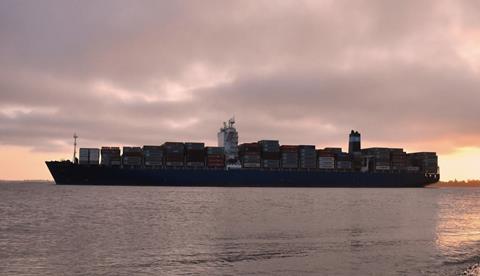SNA warns that China could reject the entire cargo aboard Maersk’s Saltoro containership
Maersk’s Saltoro containership has finally arrive at China’s port of Nansha, 28 days later than scheduled, after breaking down in the Pacific Ocean last month.

The vessel, part of the Cherry Express service, was carrying 1,353 containers of cherries from southern Chile, heading for China for the Chinese New Year celebrations.
Although the power supply to containers was maintained and the cold chain remained unbroken, the fruit has arrived in poor condition according to Antonio Walker, president of the National Association of Agriculture (SNA), who inspected the containers on board the vessel.
Walker warned that the quality of the cherries is compromised, and that China could reject the entire cargo. Currently, Maersk and Chinese Customs are discussing the future of the merchandise.
Claudia Soler, executive director of the Chilean Fruit Cherry Committee, commented: “According to what the Chinese authorities have reported to us, the first inspections are currently being carried out on the ground to evaluate the conditions and quality of the fruit that recently arrived at the Port of Nansha, a task that could take several days given the high volume transported. Now, we must wait for the reports delivered by these authorities to evaluate the possible scenarios”.
The president of Fedefruta, Víctor Catán, said the losses could exceed US$100mn, affecting small, medium and large producers. According to Catán, the most affected are the small producers, who depend entirely on this sale. “Many of our producers need that flow from this sale to be able to continue working,” he said.
Posting on LinkedIn, Claudio Aguilar, CEO at RSK Group said: “As of 18 February, 2025, no containers from the Maersk Saltoro have been released. Only 100+ containers have been unloaded, with 12 under inspection and requiring further evaluation.
“Maersk has proposed unloading the remaining 1,200+ containers in China, leaving legal negotiations to their lawyers, importers, and China Customs. However, China Customs is unwilling to accept these containers, citing food safety concerns.
“The key issues are: Food safety risks –no containers have been released due to the high probability of inedible fruit, and limited destruction capacity – Nansha Customs can only process six to ten loads per day, making mass disposal a logistical challenge.
“With discussions between Maersk, China Customs, and consignees still ongoing, a solution remains elusive. The Maersk Saltoro waits, but a resolution seems further away than ever.”
The Saltoro situation is a harsh blow for Chile’s cherry industry in what is proving to be a difficult campaign. Prices in China plummeted in the run-up to the New Year festivities as the market struggled to absorb record shipment volumes.
With many newly planted hectares yet to come into production, Chile’s export volume is set to continue rising sharply in the coming years.
“We have to do a very deep analysis so that we learn the lesson. The [Chinese] market with 83mn cartons responded very well and with 115mn it did not,” Walker said last month.
While the industry has long discussed the need for greater market diversification, the lure of the high prices China is prepared to pay for top quality fruit has proven to be too strong for exporters to ignore.
In light of this season’s results, however, it is clear that efforts to open up new markets are set to intensify, with India, the Middle East and North Africa all in the frame.



